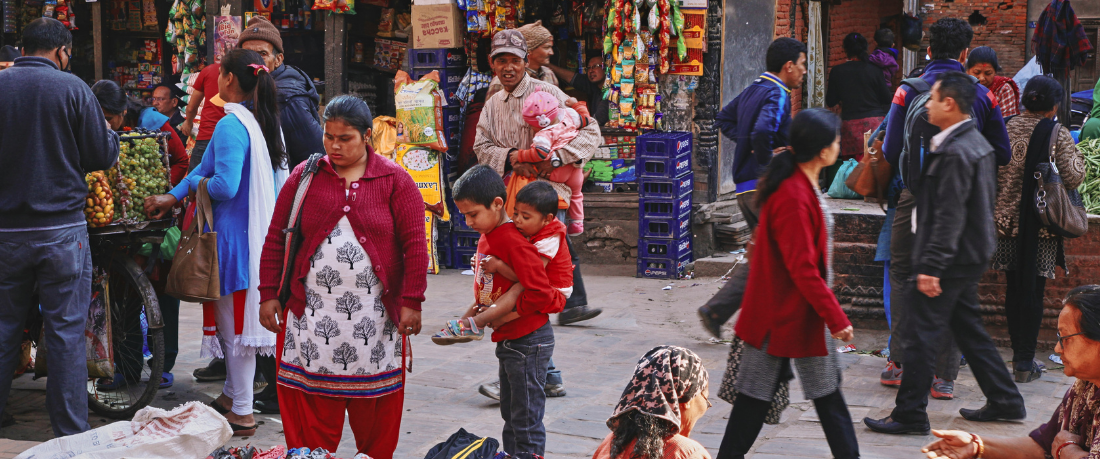Street vendors are a ubiquitous part of the urban landscape in Kathmandu, where they form a vital part of the informal economy. Over half of Nepal’s street vendors are women, many of whom migrated to the capital from rural regions in search of better economic opportunities. Yet, despite the essential services they provide, street vendors frequently encounter hostility from the authorities. This is evident in the repeated clashes they face with the police, and the prohibitions enforced by the local municipal government of Kathmandu. The mainstream narrative is that street vendors are a blight on the cityscape, cluttering sidewalks and tarnishing the aesthetic of urban spaces. Yet, there is a way to reconcile these perceptions with the undeniable contributions these vendors bring to the vibrancy and economy of our cities. The question we must ask is: Who does the city truly belong to?
The concept of the “right to the city,” challenges us to see urban spaces not as the exclusive domain of a privileged few but as shared landscapes, open to all who live there. It asserts that cities are not mere backdrops for capital and control but dynamic environments shaped and reshaped by the people who inhabit them. This perspective pushes against the dominant idea that street vendors are ‘nuisances’, and recognises them as legitimate participants in shaping urban life.
In the region, we have the example of India, where street vendors have some legal protections, and are recognised as essential service providers. However, Nepal lacks such federal legislation, leaving vendors vulnerable to harassment and eviction at the discretion of city authorities.
On one hand, street vendors argue that they play a crucial economic and social role, providing low-cost goods and essential services to lower-income residents who may not have access to more expensive retail options. Street vendors, with their stalls of fresh produce, low-cost meals, handcrafted goods, and more, are more than just fixtures of convenience—they are integral to the social and economic fabric of cities. They create informal economies that sustain thousands of families and provide access to affordable goods and services for urban residents.
On the other hand, city authorities are justifiably concerned with maintaining pedestrian flows and reducing congestion.
What is the Answer?
These conflicting perspectives highlight the need for ethical urban governance, which balances regulatory enforcement with the needs of vulnerable urban populations. One potential solution could be to designate specific times and zones for street vending activities, particularly during non-peak hours. Such policies have been successful in cities like Bangkok, allowing vendors to operate without obstructing pedestrian traffic or disrupting peak commuting hours. Similarly, some cities in Nepal, such as Gokarneshwor, have developed dedicated markets for street vendors. These are equipped with essential facilities that improve their working conditions. Such initiatives protect vendors from arbitrary harassment by authorities, and also foster a more cooperative relationship with city officials.
A Shift in Mental Terrain
But such measures alone are not enough. The creation of such physical spaces need to be accompanied by a corresponding shift in public perception. The narrative that street vendors disrupt public order must be balanced with the recognition of their contribution to local economies and communities. Without this shift, policies risk being punitive rather than inclusive, often enforcing regulations that disproportionately impact the urban poor.
Instead, initiatives that engage vendors in decision-making processes, provide inclusive policies, and offer them legal protections, can be transformative. Moreover, efforts to integrate street vendors into the formal economy—by providing registration, training, and identification cards—can legitimise their work while enabling them to contribute to the economy.
Recognising and respecting the “right to the city” for all inhabitants, including street vendors, is vital to creating equitable urban environments. By balancing regulatory needs with ethical considerations and involving street vendors in urban planning, cities can move towards a model that values social inclusion alongside economic and physical order. Ultimately, the cities we build reflect the values we choose—equity, inclusion, and belonging. Because in answering who the city belongs to, we ultimately decide who we are as a society.
*By Roshani Regmi–Program Officer, Nepal







